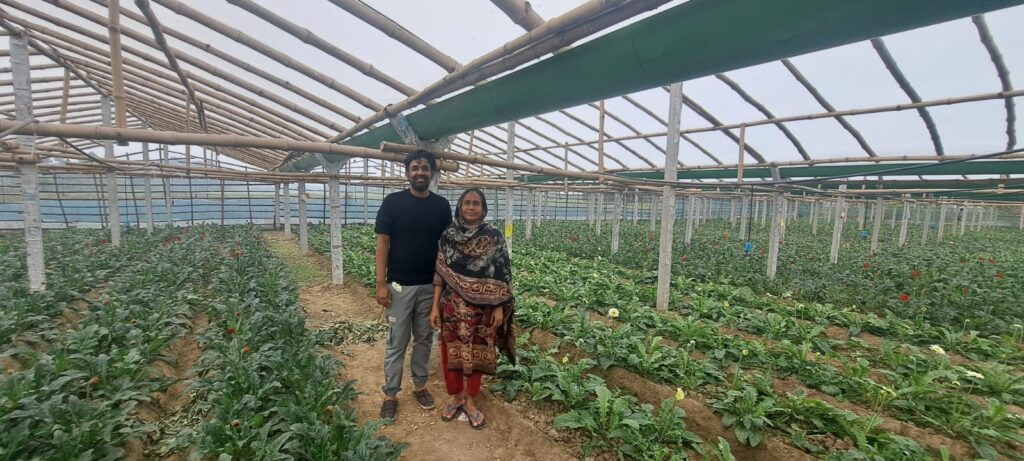
In the heart of Jashore district’s Godkhali area, the EACCH team recently met with Sajeda Begum, a resilient flower cultivator whose journey is a testament to perseverance and adaptation in the face of climate change.
Ten years ago, a tragic accident left Sajeda’s husband paralyzed, prompting her to step into the realm of flower farming to support her family. Despite facing significant challenges due to prevailing gender norms, Sajeda began her venture on a modest half bigha of land. Today, she has expanded her enterprise to five bighas, with three dedicated to flower cultivation. Her farm thrives with a diverse array of blooms, including roses, rosaries, and gerberas. With support from government and non-governmental organizations, she proudly manages three sheds.
The journey has not been without setbacks. In 2020, Cyclone Amphan devastated Sajeda’s farm, destroying her sheds and causing extensive crop damage. Undeterred, she demonstrated remarkable resilience, leveraging external aid and private investment to rebuild her farm. The COVID-19 pandemic posed additional challenges, significantly reducing the demand for flowers and resulting in substantial losses. However, Sajeda’s tenacity saw her through these tough times. Beyond her success as a flower grower, Sajeda is also a master trainer. She has received extensive training from various NGOs and even gained international exposure through a USAID-sponsored visit to India. Her commitment to sustainable farming practices is evident in the compost she creates to enhance flower quality. Sajeda is a vocal advocate for gender equality in floriculture. She highlights the need for greater opportunities and privileges for women in the industry, aiming to break down the barriers that hinder their progress.
Climate change poses a severe threat to Sajeda’s floriculture business. Rising temperatures, new diseases, and increased insect attacks are adversely affecting her crops. Despite these challenges, her flowers have shown resilience, particularly during the winter months. Sajeda emphasizes the urgent need for improved transport, communication, and security to safeguard her produce. To further support local flower growers like herself, Sajeda proposes several measures:
1. Reduce the Import of Plastic Flowers: By decreasing imports, the demand for locally produced flowers can increase, ensuring fair prices for farmers.
2. Enhance Transport and Communication: Improved infrastructure will help in the timely and safe delivery of produce.
3. Ensure Fair Pricing: Government intervention to regulate and ensure fair prices for local flowers will support the sustainability of the industry
Sajeda Begum’s story is one of resilience, adaptation, and advocacy. Her journey underscores the critical need for climate change adaptation strategies in Bangladesh’s floriculture sector. By addressing these challenges head-on and implementing sustainable practices, Sajeda not only secures her livelihood but also paves the way for a more resilient agricultural future in Bangladesh.
———–Md. Arif Chowdhury
